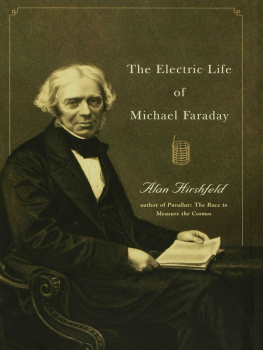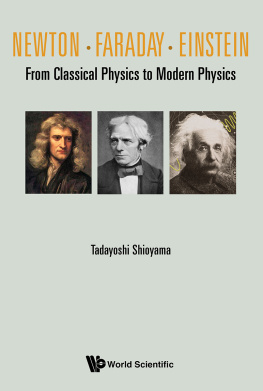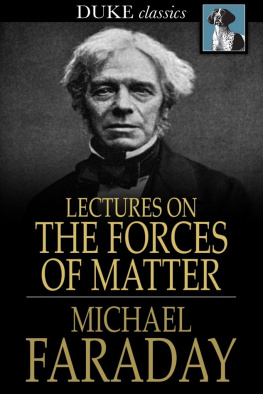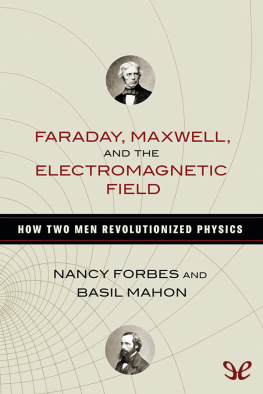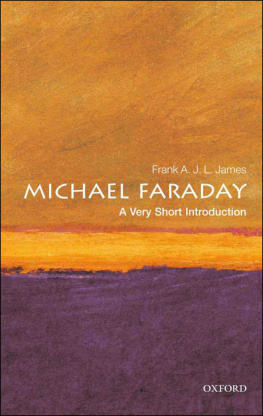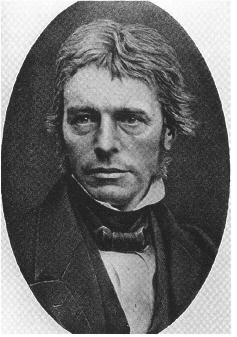THE
ELECTRIC LIFE
OF
MICHAEL FARADAY
Alan Hirshfeld

Copyright 2006 by Alan Hirshfeld
All rights reserved. No part of this book may be reproduced or transmitted in any form or by any means, electronic or mechanical, including photocopying, recording, or by any information storage and retrieval system, without permission in writing from the Publisher.
First published in the United States of America in 2006 by
Walker Publishing Company, Inc.
Distributed to the trade by Holtzbrinck Publishers.
For information about permission to reproduce selections from this book, write to Permissions, Walker & Company, 104 Fifth Avenue, New York, New York 10011.
All papers used by Walker & Company Publishing are natural, recyclable products made from wood grown in well-managed forests. The manufacturing processes conform to the environmental regulations of the country of origin.
Library of Congress Cataloging-in-Publication Data
Hirshfeld, Alan.
The electric life of Michael Faraday / Alan Hirshfeld.
p. cm.
Includes bibliographical references and index.
eISBN: 978-0-802-71823-5
1. Faraday, Michael, 1791-1867. 2. Physicists-Great Britain-Biography. I. Title.
QC16.F2H57 2006
530.092-dc22
[B]
2005025533
Visit Walker & Company's Web site at www.walkerbooks.com
Typeset by Westchester Book Group
Printed in the United States of America by Quebecor World Fairfield
2 4 6 8 10 9 7 5 3 1
For Sally, who taught me to riff
CONTENTS
Science is not a collection of facts, any more than opera is acollection of notes. It's a process, a way of thinking,a method based on a single insightthat the degree towhich an idea seems true has nothing to do with whether itis true, and that the way to distinguish factual ideas fromfalse ones is to test them by experiment.
TIMOTHY FERRIS, "NOT ROCKET SCIENCE,"
The New Yorker (JULY 20, 1998), p. 5
[E]ven if I could be Shakespeare, I think
I should still choose to be Faraday.
ALDOUS HUXLEY
The capsule version of Michael Faraday's life reads like a fairy tale: Through sheer gumption and timely luck, a poor, unschooled bookbinder's apprentice in nineteenth-century England surmounted adversity and class prejudice to become the greatest experimental scientist of his time. We are the beneficiaries of Faraday's good fortune. The electric motors that raise our elevators, spin our fans, and propel our hybrid cars trace their origins to Faraday's laboratory. The generators that electrify our reading lights and computers stem from the copper disk Faraday spun between the poles of a magnet more than a century and a half ago. The transformers that enable electricity to race hundreds of miles across the countryside and then safely into our homes are descendents of Faraday's wire-encased iron rings. And the development of the theoretical principles underlying these electrical, magnetic, and luminous marvels was inspired by Faraday's farsighted speculations.
Faraday's particular gift as an experimentalist was to make visible in the laboratory that which had been invisible, to magnify nature's subtle effects so they could be perceived and measured. He vaulted to fame in the 1830s after developing a host of ideas, processes, and devices that undergird modern technology. Then he embarked on a decades-long quest for the holy grail of nineteenth-century physics: a comprehensive theory of electricity, magnetism, force, and light. Here he entered a realm where experimental verification was difficult, if not impossiblethe realm of the mathematician, who solves equations to find plausible explanations for physical phenomena. And Faraday, facile as he was in the laboratory, was a grade-school mathematician. The marathon of experimentation and cogitation produced a raft of important scientific resultsbut also broke Faraday's health. He suspended his research for five gloomy years, only to return with a triumphant experiment showing that magnetism affects light. It was not until the twilight of Faraday's career that a young admirer, James Clerk Maxwell, cast his hero's controversial speculations about the nature of light and the transmission of force into the abstract symbolism of mathematics. The result-Maxwell's famous field equations-was a radically new vision of nature, whose ramifications not only inspired a new generation of physicists, including Einstein, but still resound today.
If there was one overriding element to Faraday's character, it was humility. His "conviction of deficiency," as he called it, stemmed in part from his deep religiosity and affected practically every facet of his life. Thus Faraday approached both his science and his everyday conduct unhampered by ego, envy, or negative emotion. In his work, he assumed the inevitability of error and failure; whenever possible, he harnessed these as guides toward further investigation. Faraday adhered to no particular school of scientific thought. Nor did he flinch when a favored hypothesis fell to the rigors of experiment. In the personal realm, Faraday subjected himself to constant self-examination and correction. Only his belief in God rested solely on unquestionable faith. Although devout, he kept a strict separation between his religious practice and the methods of science. In fact, to reveal nature's design through scientific study, in his opinion, only affirmed the glory of God. Religion provided motivation, not method, in Faraday's work.
Faraday also made contributions in civic affairs beyond his renowned science lectures for the public. Toward the end of his career, Faraday used the weight of his reputation to crusade for science education and environmental responsibility. His views on these subjects sound remarkably apt today, a century and a half later. His complaints about the pollution of the Thames River triggered long-term efforts to improve water quality. Faraday also led a quixotic charge against the public's propensity toward superstition and pseudoscience, which he denounced as a "disgrace to the age." He would be similarly appalled by today's New Age hokum and by attempts of extremists to inject religious ideology into scientific education.
My interest in Michael Faraday runs deep, not just in my capacity as a physics professor at the University of Massachusetts, Dartmouth, but in the arc of my career. Like Faraday, I felt the tug of science at a young age. I, too, immersed myself in books on science and sought out mentors to teach me what I needed to know. I, too, aspired to a life exploringand explaining to othersthe wonders of nature. The name "Faraday" has been in my consciousness since at least 1970, when I took freshman physics and studied his experiments in electricity and magnetism. Yet it was in researching this book during the past two years that I truly discovered who he was.
The more I got to know Faraday through his many scientific reports, letters, journals, and diaries, the more I enjoyed "having brim around." I felt as though I were there in his laboratory, peering over his shoulder as he unraveled nature's mysteries. And at his Friday evening lectures, witnessing spectacular science demonstrations. And on his walks in the countryside, admiring the hue of the sunset or the spectacle of a thunderstorm. I shared his joy in discovery, his pain in failure, his sheer exuberance in the scientific endeavor. Frankly, at times my identification with Faraday went too far, as when I was writing the chapter about his collapse from overwork-only to suffer a similar bout of exhaustion myself. So much a living spirit did he become to me that I found it difficult at the end of the book to pen his death. (I felt compelled to "resurrect" him in an epilogue.)

